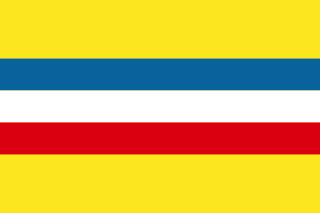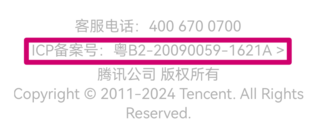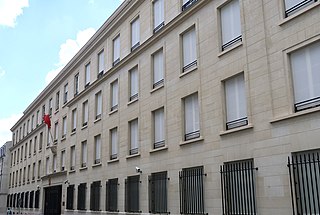
Postal romanization was a system of transliterating Chinese place names developed by postal authorities in the late 19th and early 20th centuries. For many cities, the corresponding postal romanization was the most common English-language form of the city's name from the 1890s until the 1980s, when postal romanization was replaced by pinyin, but the system remained in place on Taiwan until 2002.
Gwoyeu Romatzyh, abbreviated GR, is a system for writing Standard Chinese in the Latin alphabet. It was conceived by Yuen Ren Chao, who led a group of linguists to develop the system from 1925 to 1926. From 1942 to 2000, a small number of reference works published in Hong Kong and overseas made use of the system, and Chao would use it throughout his later linguistics work, including in his most influential publications. However, Gwoyeu Romatzyh never achieved widespread use among the Chinese public. In places where it had been used, it was eventually replaced—largely by Hanyu Pinyin, which became the international standard romanization during the second half of the 20th century. Pinyin itself made use of principles originally introduced by Gwoyeu Romatzyh, whose influence is often reflected in the design of later systems.

Zhang ( ) is the third most common surname in China and Taiwan, and it is one of the most common surnames in the world. Zhang is the pinyin romanization of the very common Chinese surname written 张 in simplified characters and 張 in traditional characters. It is spoken in the first tone: Zhāng. It is a surname that exists in many languages and cultures, corresponding to the surname 'Archer' in English for example. In the Wade-Giles system of romanization, it is romanized as "Chang", which is commonly used in Taiwan; "Cheung" is commonly used in Hong Kong as a romanization.

The French School of the Far East, abbreviated EFEO, is an associated college of PSL University dedicated to the study of Asian societies. It was founded in 1900 with headquarters in Hanoi in what was then French Indochina. After the independence of Vietnam, its headquarters were transferred to Phnom Penh in 1957, and subsequently to Paris in 1975. Its main fields of research are archaeology, philology and the study of modern Asian societies. Since 1907, the EFEO has been in charge of conservation work at the archeological site of Angkor.
Laowai is the Pinyin pronunciation/transliteration of 老外, an informal term or slang for "foreigner" and/or non-Chinese national, usually neutral but possibly impolite or loose in some circumstances. Formal and polite Chinese terms for foreigner include wàiguórén, wàibīn, guójì yǒurén国际友人; 國際友人; 'international friend') and wàiguó pengyou. "Laowai" is commonly used to refer to foreigners of non-Asian ethnicities. The term usually does not refer to ethnic Han of non-Chinese citizenship or other Asian ethnicities.
The CEDICT project was started by Paul Denisowski in 1997 and is maintained by a team on mdbg.net under the name CC-CEDICT, with the aim to provide a complete Chinese to English dictionary with pronunciation in pinyin for the Chinese characters.

Nicolas Trigault (1577–1628) was a Jesuit, and a missionary in China. He was also known by his latinised name Nicolaus Trigautius or Trigaultius, and his Chinese name Jin Nige.

The Young China Party (YCP), also known as the Chinese Youth Party (CYP), is a minor political party in Taiwan. It was one of the three legal political parties in Taiwan during the martial law period from 1949 to 1987, the other two being the Kuomintang and the China Democratic Socialist Party. The YCP was an important political party during the early history of the Republic of China, when its government was based on the mainland.

ICP license is a permit issued by the Chinese Ministry of Industry and Information Technology (MIIT) to permit China-based websites to operate in China. The ICP license numbers for Chinese websites can often be found on the bottom of the front webpage.
Chih-Wei Huang is a developer and promoter of free software who lives in Taiwan. He is famous for his work in the VoIP and internationalization and localization fields in Greater China. The user name he usually uses is cwhuang.
Séraphin Couvreur was a French Jesuit missionary to China, sinologist, and creator of the EFEO Chinese transcription. The system devised by Couvreur of the École française d'Extrême-Orient was used in most of the French-speaking world to transliterate Chinese until the middle of the 20th century, after what it was gradually replaced by pinyin.

The Chinese Text Project is a digital library project that assembles collections of early Chinese texts. The name of the project in Chinese literally means "The Chinese Philosophical Book Digitization Project", showing its focus on books related to Chinese philosophy. It aims at providing accessible and accurate versions of a wide range of texts, particularly those relating to Chinese philosophy, and the site is credited with providing one of the most comprehensive and accurate collections of classical Chinese texts on the Internet, as well as being one of the most useful textual databases for scholars of early Chinese texts.

Chinese Tartary is an archaic geographical term referring to the regions of Manchuria, Mongolia, Xinjiang, and Tibet under the rule of the Qing dynasty of China. The geographical extent of Chinese Tartary largely corresponds with that of the "Feudatory Regions", as defined by the Qing court. The term "Tartar" was used by Europeans to refer to ethnicities living in northern, northeastern, and western China, including the Mongols, Manchus, Tibetans, and Central Asians. Some definitions include the Japanese. The regions are now more commonly referred to by scholars as Inner Asia.
Antoine-Pierre-Louis Bazin, or A. P. L. Bazin was a French sinologist born in Saint-Brice-sous-Forêt. He was the brother of dermatologist Pierre-Antoine-Ernest Bazin (1807-1878).
Jacques Dars was a French sinologist and translator. He translated several works into French, including Water Margin.

Haoqiu zhuan, also known as Hau Kiou Chuaan, is a Chinese caizi jiaren novel published in the 17th-century. The author is known only under the name "Man of the Teaching of Names". The identity of the author and exact date of publishing are not known. Caizi jiaren fictional works published at that time in the Qing Dynasty typically were under a pseudonym.
Le Grand Ricci, published in 2001, is a highly comprehensive Chinese–French dictionary, largely focusing on historical Chinese. It takes its name from the 15th century Italian missionary Matteo Ricci.

Evolis is a French plastic card manufacturing company. Their headquarters and the production facility are located near Angers, France.

Shi is a Chinese surname meaning "season" or "time". It is romanized Shih in Wade–Giles, or Si in Cantonese romanization. According to a 2013 study, it was the 187th most common name in China; it was shared by 670,000 people, or 0.05% of the population, with the province with the most people being Henan. It is the 83rd name on the Hundred Family Surnames poem.

The Embassy of the People's Republic of China in the Republic of France is the official diplomatic mission of the People's Republic of China to the French Republic, located in Paris. The embassy was first established in 1964, and the current ambassador is Lu Shaye.












